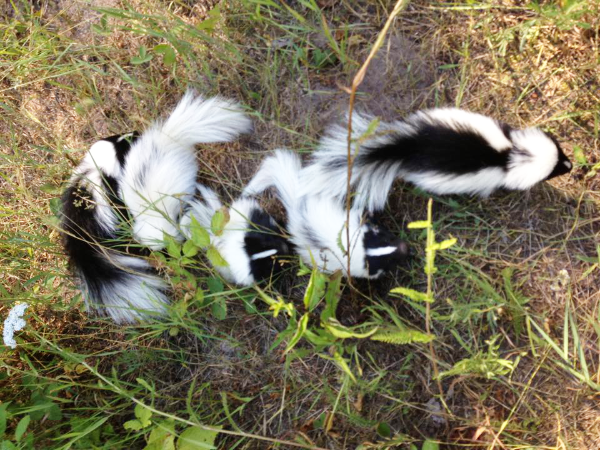Skunk Diseases

When thinking about skunks, often times the first thing that comes to mind is their unique appearance and strong odor. But there is a more serious side when it comes to skunks, they can be dangerous or harmful to people, pets and other animals. Skunks are known to carry a number of diseases, and even though these diseases are not detrimental to humans there are associated risks that need to be considered if residing near a skunk. Learning to avoid a bite or altercation with a skunk can greatly reduce the risk to you, your family and your pets.
It is important to note that skunks can transmit diseases in a variety of different ways, so if you are experiencing a skunk problem keep this information in mind. Most skunks will run away when approached, however, if they do feel trapped, they will attack by biting or scratching. This is one of the ways that skunk diseases can be transmitted. Skunk diseases may also be transmitted through urine or feces. If a person or pet comes into contact with a skunk’s excrement, then it is possible that they may contract one of many skunk diseases. You may be wondering about the dangers of skunk spray, but aside from the offensive stench that hangs in the air, no diseases are transmitted through skunk sprays.
Here are a few skunk diseases you should be aware of:
Leptospirosis – This is a rare bacterial disease that can affect all mammals including humans. This disease is spread when mammals come in to contact with the urine of an infected animal through water, soil or food. Swimming in water or touching soil that is diseased can cause infection through skin contact, especially through orifices such as the eyes, nose or broken skin. Some side-effects or symptoms of this disease arise within 5 to 14 days after exposure and include fever, chills, coughing, irregular heartbeat, nosebleeds, headache, diarrhea, jaundice, muscle pain, rash, etc. Treatment for mild versions of this disease is antibiotics such as penicillin. For severe versions, hospitalization may be required in addition to antibiotics.
Distemper – It can be spread to many other animals, but it does not affect humans. This disease is a highly contagious viral disease that often affects domestic dogs and other animals. Unfortunately, it is an incurable, multisystemic disease that is often fatal. It commonly affects the respiratory, gastrointestinal and central nervous systems. Despite the fact that there is no cure, dogs can be vaccinated preventatively.
Rabies – Skunks are the main carrier of rabies in the United States. Although this disease is fairly common, it can be fatal to both humans and pets if not treated quickly. There are two types of rabies – the “furious” and “dumb” forms. Skunks will become aggressive if infected with the “furious” form and they will not be fearful of humans if infected with the “dumb” form. Healthy skunks are known to run off if approached by people or pets. If you notice a skunk displaying any signs or rabies make sure to contact animal control.

